人教版七年级下册英语Unit 6教案教学设计
- 格式:doc
- 大小:118.00 KB
- 文档页数:11
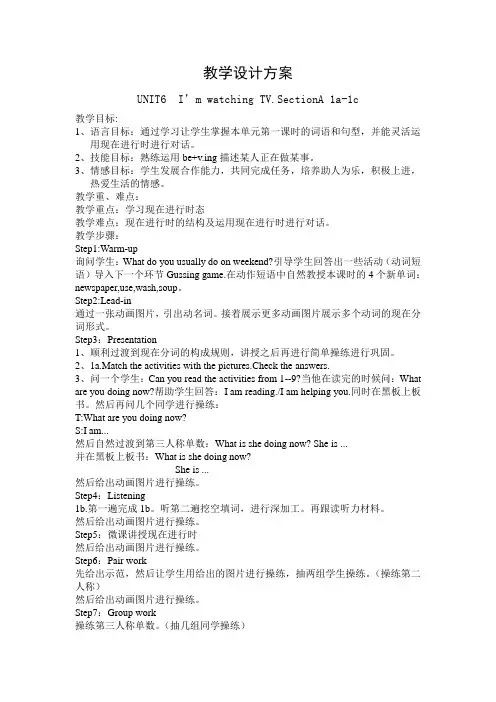
教学设计方案UNIT6 I’m watching TV.SectionA 1a-1c教学目标:1、语言目标:通过学习让学生掌握本单元第一课时的词语和句型,并能灵活运用现在进行时进行对话。
2、技能目标:熟练运用be+v.ing描述某人正在做某事。
3、情感目标:学生发展合作能力,共同完成任务,培养助人为乐,积极上进,热爱生活的情感。
教学重、难点:教学重点:学习现在进行时态教学难点:现在进行时的结构及运用现在进行时进行对话。
教学步骤:Step1:Warm-up询问学生:What do you usually do on weekend?引导学生回答出一些活动(动词短语)导入下一个环节Gussing game.在动作短语中自然教授本课时的4个新单词:newspaper,use,wash,soup。
Step2:Lead-in通过一张动画图片,引出动名词。
接着展示更多动画图片展示多个动词的现在分词形式。
Step3:Presentation1、顺利过渡到现在分词的构成规则,讲授之后再进行简单操练进行巩固。
2、1a.Match the activities with the pictures.Check the answers.3、问一个学生:Can you read the activities from 1--9?当他在读完的时候问:What are you doing now?帮助学生回答:I am reading./I am helping you.同时在黑板上板书。
然后再问几个同学进行操练:T:What are you doing now?S:I am...然后自然过渡到第三人称单数:What is she doing now? She is ...并在黑板上板书:What is she doing now?She is ...然后给出动画图片进行操练。
Step4:Listening1b.第一遍完成1b。
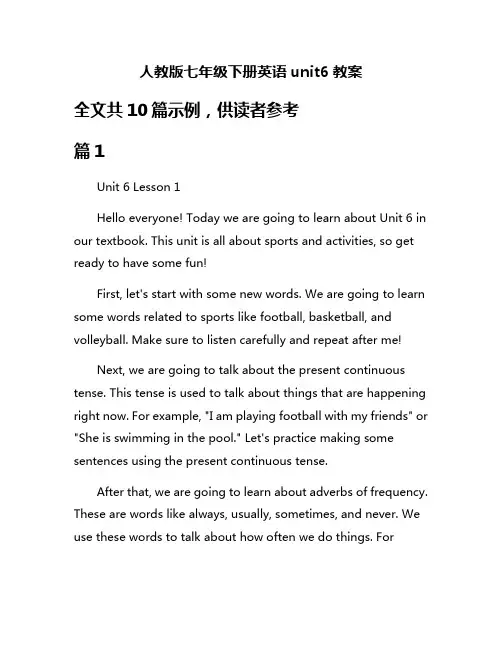
人教版七年级下册英语unit6教案全文共10篇示例,供读者参考篇1Unit 6 Lesson 1Hello everyone! Today we are going to learn about Unit 6 in our textbook. This unit is all about sports and activities, so get ready to have some fun!First, let's start with some new words. We are going to learn some words related to sports like football, basketball, and volleyball. Make sure to listen carefully and repeat after me!Next, we are going to talk about the present continuous tense. This tense is used to talk about things that are happening right now. For example, "I am playing football with my friends" or "She is swimming in the pool." Let's practice making some sentences using the present continuous tense.After that, we are going to learn about adverbs of frequency. These are words like always, usually, sometimes, and never. We use these words to talk about how often we do things. Forexample, "I always go running in the morning" or "She never eats vegetables." Let's practice using these words in sentences.Finally, we are going to do a fun activity where we talk about our favorite sports and activities. You can ask your classmates questions like "Do you like playing basketball?" or "How often do you go swimming?" Remember to use the new words and grammar we have learned today!That's all for today's lesson. I hope you enjoyed learning about sports and activities with me. See you next time!篇2Unit 6: I'm watching TVLesson 11. Learn to talk about television shows2. Practice asking and answering questions about TV shows3. Learn new words related to televisionHi everyone! Today we are going to learn about television shows. Do you like watching TV? What's your favorite show? Let's learn some new words related to television first.New words:- Program: a TV show- Channel: a TV station- News: information about what's happening in the world- Cartoon: animated TV show- Comedy: a funny TV show- Drama: a serious TV showNow let's practice asking and answering questions about TV shows. For example:Q: What's your favorite TV show?A: My favorite TV show is "Friends".Q: What type of TV show do you like?A: I like comedies.Q: What time is your favorite show on?A: It's on at 8:00 pm.Now let's talk about the TV shows we like. I'm sure we all have different preferences, so let's share with each other and learn more about the different shows we enjoy.That's all for today! Keep watching your favorite shows and have fun learning English! See you next time!Lesson 21. Learn to talk about what people are doing2. Practice using the present continuous tense3. Learn new words related to activitiesHello everyone! Today we are going to learn how to talk about what people are doing. Let's learn some new words related to activities first.New words:- Watching: looking at something on TV or in person- Reading: looking at words in a book or on a screen- Playing: doing an activity for fun- Eating: putting food in your mouth- Listening: paying attention to soundsNow let's practice using the present continuous tense to talk about what people are doing. For example:Q: What is Sarah doing?A: She is watching TV.Q: What are you doing right now?A: I am reading a book.Q: What are they doing on the playground?A: They are playing basketball.Now let's talk about what we are doing. You can use the present continuous tense to describe your actions at the moment. Let's have fun practicing and learning together.That's all for today! Keep practicing English and enjoy your favorite activities. See you next time!篇3Unit 6: What time do you go to school?Hello everyone! Today we are going to learn all about time in Unit 6. We will learn how to talk about different times in English and also how to ask and answer questions about time. Let's get started!1. Warm-up:To warm up, we are going to start by practicing telling the time. I will show you a clock and you have to say the time inEnglish. For example, if the clock shows 9:30, you will say "It's nine thirty". Are you ready? Let's begin!2. Vocabulary:Next, we are going to learn some new vocabulary related to time. We will learn words such as morning, afternoon, evening, night, hour, minute, o'clock, etc. Repeat after me and practice saying the new words out loud.3. Grammar:Now, let's talk about how to ask and answer questions about time. We will learn questions like "What time do you get up?" and "What time do you go to bed?". We will also learn how to answer these questions using the correct time. For example, "I get up at seven o'clock" or "I go to bed at ten thirty".4. Listening:For the listening activity, I will play a recording of different people talking about their daily routines. Listen carefully and try to understand what time they do different activities. After the recording, we will discuss the answers together.5. Speaking:In this activity, we will practice asking and answering questions about time. Pair up with a partner and take turns asking each other questions such as "What time do you have breakfast?" and "What time do you do your homework?". Practice speaking in complete sentences and using the correct time.6. Writing:Finally, we will do a writing activity where you have to write about your own daily routine. Write down what time you wake up, eat meals, go to school, do homework, etc. Be sure to use the correct time format and organize your sentences in a clear and logical way.That's all for today's lesson on Unit 6: What time do you go to school? I hope you enjoyed learning about time with me. Remember to practice telling the time and asking questions about time with your friends and family. See you next time! Bye bye!篇4Unit 6 Our Local AreaHello everyone! Today we are going to learn about Unit 6 "Our Local Area" in the seventh grade English textbook. Are you all ready? Let's get started!First, we will learn some new words related to our local area, such as "neighborhood", "busy", "peaceful" and so on. Make sure to remember these words because we will use them a lot in our lesson.Next, we will talk about the different places in our local area, like the park, the library, the hospital, and the supermarket. We will learn how to give directions to these places and also talk about the activities we can do there. For example, we can say "The park is on the left. We can play basketball there."After that, we will learn how to describe our neighborhood using adjectives. Is your neighborhood noisy or quiet? Is it clean or dirty? Tell me about it using words like "crowded", "beautiful", "noisy", and "clean".Finally, we will practice reading, writing, speaking, and listening using the new vocabulary and grammar we have learned. We will have quizzes, games, and group activities to help us remember everything we have studied.I hope you are all excited to learn about our local area today! Let's have fun and improve our English skills together. See you in the next class!篇5Unit 6Hello everyone! Today we are going to learn about Unit 6 in our textbook. This unit is all about vacations and we are going to have so much fun learning about different vacation activities and destinations.Learning Goals:1. To be able to talk about different vacation activities.2. To learn new vocabulary related to vacations.3. To practice speaking and writing about our dream vacations.Warm-up:Let's start by talking about our favorite vacation activities. Raise your hands and share with the class what you like to do on vacation. Do you like to go swimming, hiking, or maybe just relax on the beach?Vocabulary:Now let's learn some new words related to vacations. Let's repeat after me: beach, camping, sightseeing, snorkeling, hiking, souvenir. These words will help us talk about different vacation activities.Listening:Listen to the audio and answer the questions about different vacation destinations. Pay attention to the details and try to understand where the people in the audio are going on vacation.Speaking:Now it's time for some role play! Pair up with a classmate and imagine you are planning a vacation together. Decide on a destination, activities, and what souvenirs you want to buy. Then share your plans with the class.Writing:For our writing activity, I want you to write a short paragraph about your dream vacation. Where would you go? What activities would you do? Who would you go with? Be creative and use the vocabulary we learned today.Class Discussion:Let's end our lesson with a class discussion about our dream vacations. Raise your hand and share with the class where you would like to go on vacation and why. Let's learn from each other's ideas and maybe even get inspired to plan our own dream vacations.Homework:For homework, I want you to write a postcard to a friend, telling them about your dream vacation. Include details about the destination, activities, and souvenirs you would buy. Don't forget to use the vocabulary we learned today!That's all for today's lesson. I hope you enjoyed learning about vacations with me. Have a great day and start dreaming about your next adventure!篇6Unit 6 Animals in dangerHi everyone! Today I'm going to tell you all about Unit 6 in our English textbook. It's all about animals in danger and how we can help them.First, we will learn about different endangered animals like pandas, tigers, and elephants. We will also talk about the reasonswhy these animals are in danger, like hunting and deforestation. It's important for us to understand why these animals need our help.Next, we will learn some vocabulary words related to animals in danger. Words like endangered, extinct, habitat, and conservation. These words will help us understand more about the topic and how we can protect these animals.After that, we will read some stories about people who are helping endangered animals. We will learn about what they are doing to protect these animals and how we can do our part to help too. It's important for all of us to work together to save these animals.In our workbook, we will have some fun activities like matching the animals with their habitats, completing sentences with the correct vocabulary words, and answering questions about the stories we read. These activities will help us review what we learned in class.Finally, we will have a project where we can choose an endangered animal to research and present to the class. We can talk about why this animal is in danger and what we can do to help save it. It's a great way for us to learn more about these animals and how we can make a difference.I hope you all enjoy learning about animals in danger in Unit6. Remember, it's up to us to protect these animals and make sure they have a safe and happy home. Let's work together to save them!篇7Hello everyone! Today I'm going to share with you the lesson plan for Unit 6 in the New Curriculum Grade 7 English textbook.Title: Unit 6 - Sports and HobbiesObjectives:1. To introduce new vocabulary related to sports and hobbies2. To practice speaking and listening skills through discussions about favorite sports and hobbies3. To enhance reading comprehension skills by reading and discussing a text about different sports4. To develop writing skills by writing a short paragraph about personal interests in sports and hobbiesWarm-up:Start the lesson by asking the students what sports or hobbies they enjoy doing. This will help generate interest in the topic and also provide a basis for discussion later on.Vocabulary:Introduce new words related to sports and hobbies such as "football", "basketball", "swimming", "painting", "dancing", "singing", "reading", etc. Use flashcards or pictures to help students remember the words.Listening and Speaking:Have a class discussion on the students' favorite sports and hobbies. Encourage them to give reasons for their choices. Pair students up to discuss their preferences and share with the class.Reading Comprehension:Read a short text about different sports and hobbies. Ask questions to check understanding and encourage students to share their thoughts on the various activities mentioned in the text.Writing:Ask students to write a short paragraph about their favorite sports and hobbies. Provide prompts such as "My favorite sportis..." or "I enjoy... because...". This will help students practice expressing their interests and opinions in writing.Conclusion:To wrap up the lesson, have a class discussion about the importance of staying active and pursuing hobbies. Encourage students to continue exploring different activities and find what they enjoy doing the most.That's it for the Unit 6 lesson plan! I hope you all have fun learning about sports and hobbies. Don't forget to stay active and try out new things. See you next time!篇8Unit 6 Aliens are coming!Hello everyone! Today we are going to learn all about aliens in Unit 6 of our English textbook. Aliens are not from Earth, they are from outer space! How cool is that?In this unit, we will learn about different types of aliens, where they might live, what they look like, and what they do. We will also learn how to talk about them in English. Are you ready? Let's get started!First, we will learn some new words like "spaceship", "alien", "planet", and "UFO". These words are all related to aliens and outer space. We will also practice listening to conversations about aliens so we can understand them better.Next, we will learn how to describe aliens using adjectives like "green", "tall", "friendly", and "strange". We will also learn how to ask questions like "What do aliens eat?" and "Where do aliens come from?" so we can learn more about them.After that, we will do some fun activities like drawing pictures of aliens and writing stories about them. We can use our imagination to create all kinds of different aliens with different powers and abilities. It will be so much fun!Finally, we will have a quiz to see how much we have learned about aliens. We can work together to answer the questions and see how well we do. I'm sure we will all do great!That's all for Unit 6. I hope you are excited to learn all about aliens with me. Let's have a blast and explore the mysterious world of outer space together. See you in the next class!篇9Unit 6: My familyLesson 1: This is my familyHello everyone! Today we are going to learn about our families. Do you know who are the members of your family? Let's start with our lesson!1. Warm-up: Let's start by talking about our own families. Can you tell me who is in your family?2. Presentation: We will learn how to talk about family members in English. For example, "This is my mum, she is my mother" and "This is my dad, he is my father".3. Practice: Let's do some role play activities to practice talking about our families. You can pretend to introduce your family members to your classmates.4. Exercise: We will have a worksheet to fill in the blanks with the correct family members' names.5. Review: Let's review what we have learned today by playing a fun game. We can also ask each other questions about our families.Homework: For homework, draw a picture of your family and label each family member in English.Lesson 2: My family treeHello class! Today we are going to learn about family trees. Do you know what a family tree is? Let's find out together!1. Warm-up: Let's review the family members we learned in the previous lesson. Who can tell me the name of their family members in English?2. Presentation: We will learn how to draw a family tree and talk about our family members using the words "grandparents", "aunts", "uncles", "cousins", etc.3. Practice: Let's practice drawing our own family trees and talking about different family relationships.4. Exercise: We will have a group activity where you will work together to create a big family tree with all your classmates' families.5. Review: Let's review what we have learned by sharing our family trees with the class and talking about our family members.Homework: For homework, write a short paragraph about your family tree and include information about your grandparents, aunts, uncles, and cousins.I hope you enjoyed today's lesson about families! See you next time!篇10Unit 6 Teaching PlanHello everyone! Today we are going to talk about Unit 6 in our English textbook. This unit is all about the future, so we will learn how to talk about plans and predictions. Let's get started!1. Warm-up (5 mins)- Start the class with a fun icebreaker activity to get everyone talking in English.- Ask students about their plans for the weekend or their favorite things to do in the future.2. Vocabulary (10 mins)- Introduce new vocabulary words related to future plans, such as 'goal', 'dream', 'plan', 'predict', 'expect', etc.- Use pictures, gestures, and examples to help students understand the meanings of these words.3. Grammar (15 mins)- Teach students how to use 'be going to' to talk about future plans and intentions.- Practice forming sentences using 'be going to', such as "I am going to study English tonight" or "She is going to travel to Japan next year".4. Speaking (20 mins)- Have students work in pairs or small groups to discuss their future plans.- Encourage them to ask each other questions using 'be going to', such as "What are you going to do this weekend?" or "Where are you going to travel next summer?".5. Reading (15 mins)- Read a short passage about someone's future plans and have students answer comprehension questions.- Discuss the predictions made in the passage and whether they agree or disagree with them.6. Writing (20 mins)- Ask students to write a paragraph about their own future plans using 'be going to'.- Encourage them to be creative and describe their dreams and goals for the future.7. Review and Homework (5 mins)- Review the key points of the lesson and make sure students understand how to use 'be going to' correctly.- Assign homework tasks, such as writing a diary entry about a future event or practicing more sentences with 'be going to'.That's all for today's lesson on Unit 6! Remember to study hard and practice using English every day. See you next time! Bye bye!。
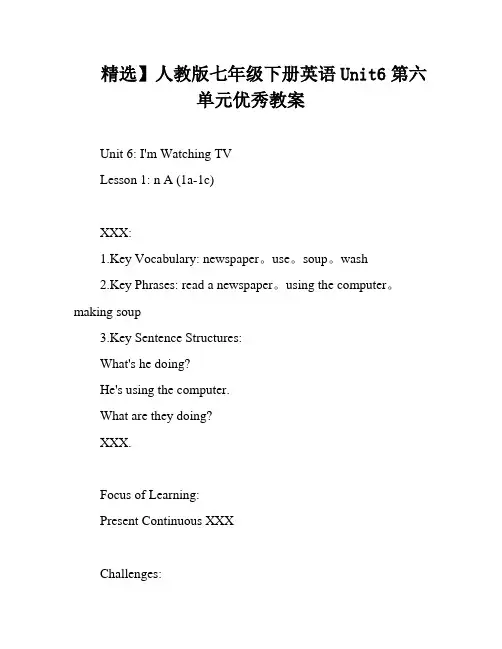
精选】人教版七年级下册英语Unit6第六单元优秀教案Unit 6: I'm Watching TVLesson 1: n A (1a-1c)XXX:1.Key Vocabulary: newspaper。
use。
soup。
wash2.Key Phrases: read a newspaper。
using the computer。
making soup3.Key Sentence Structures:What's he doing?He's using the computer.What are they doing?XXX.Focus of Learning:Present Continuous XXXChallenges:1.n of Present Participle (-ing)2.XXX using Present Continuous XXXIndependent Study:1.Preview the new words on page 31 and memorize them。
Translate the following words from Chinese to English: 报纸 (newspaper)使用 (use)汤 (soup)洗 (wash)2.Preview ns 1a。
1b。
and 1c。
Identify the following phrases and sentence structures:read a newspaperusing the computermaking souptalking on the computerWhat's he doing。
He's using the computer.What are they doing。
They are XXX.Classroom Guidance:Step 1: nXXX some students to perform ns in front of the class。
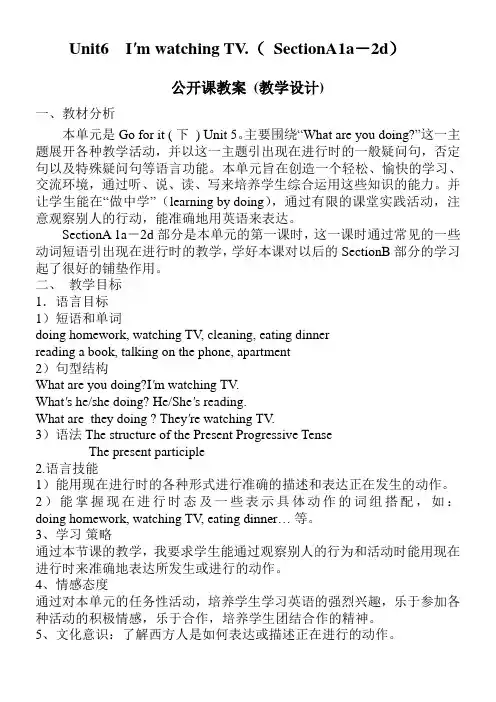
Unit6 I'm watching TV.(SectionA1a-2d)公开课教案(教学设计)一、教材分析本单元是Go for it ( 下 ) Unit 5。
主要围绕“What are you doing?”这一主题展开各种教学活动,并以这一主题引出现在进行时的一般疑问句,否定句以及特殊疑问句等语言功能。
本单元旨在创造一个轻松、愉快的学习、交流环境,通过听、说、读、写来培养学生综合运用这些知识的能力。
并让学生能在“做中学”(learning by doing),通过有限的课堂实践活动,注意观察别人的行动,能准确地用英语来表达。
SectionA 1a-2d部分是本单元的第一课时,这一课时通过常见的一些动词短语引出现在进行时的教学,学好本课对以后的SectionB部分的学习起了很好的铺垫作用。
二、教学目标1.语言目标1)短语和单词doing homework, watching TV, cleaning, eating dinnerreading a book, talking on the phone, apartment2)句型结构What are you doing?I'm watching TV.What's he/she doing? He/She's reading.What are they doing ? They're watching TV.3)语法The structure of the Present Progressive TenseThe present participle2.语言技能1)能用现在进行时的各种形式进行准确的描述和表达正在发生的动作。
2)能掌握现在进行时态及一些表示具体动作的词组搭配,如:doing homework, watching TV, eating dinner…等。
3、学习策略通过本节课的教学,我要求学生能通过观察别人的行为和活动时能用现在进行时来准确地表达所发生或进行的动作。
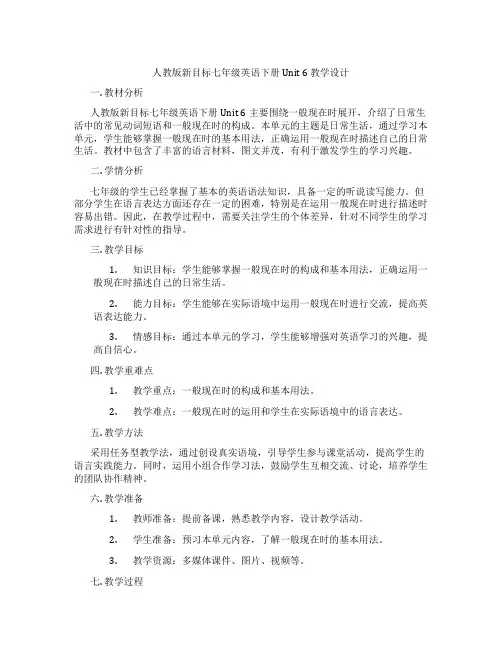
人教版新目标七年级英语下册 Unit 6 教学设计一. 教材分析人教版新目标七年级英语下册Unit 6主要围绕一般现在时展开,介绍了日常生活中的常见动词短语和一般现在时的构成。
本单元的主题是日常生活,通过学习本单元,学生能够掌握一般现在时的基本用法,正确运用一般现在时描述自己的日常生活。
教材中包含了丰富的语言材料,图文并茂,有利于激发学生的学习兴趣。
二. 学情分析七年级的学生已经掌握了基本的英语语法知识,具备一定的听说读写能力。
但部分学生在语言表达方面还存在一定的困难,特别是在运用一般现在时进行描述时容易出错。
因此,在教学过程中,需要关注学生的个体差异,针对不同学生的学习需求进行有针对性的指导。
三. 教学目标1.知识目标:学生能够掌握一般现在时的构成和基本用法,正确运用一般现在时描述自己的日常生活。
2.能力目标:学生能够在实际语境中运用一般现在时进行交流,提高英语表达能力。
3.情感目标:通过本单元的学习,学生能够增强对英语学习的兴趣,提高自信心。
四. 教学重难点1.教学重点:一般现在时的构成和基本用法。
2.教学难点:一般现在时的运用和学生在实际语境中的语言表达。
五. 教学方法采用任务型教学法,通过创设真实语境,引导学生参与课堂活动,提高学生的语言实践能力。
同时,运用小组合作学习法,鼓励学生互相交流、讨论,培养学生的团队协作精神。
六. 教学准备1.教师准备:提前备课,熟悉教学内容,设计教学活动。
2.学生准备:预习本单元内容,了解一般现在时的基本用法。
3.教学资源:多媒体课件、图片、视频等。
七. 教学过程1.导入(5分钟)教师通过展示日常生活场景的图片,引导学生谈论自己的日常生活,为新课的学习营造轻松的氛围。
2.呈现(10分钟)教师通过PPT展示一般现在时的构成和基本用法,让学生初步感知一般现在时的概念。
3.操练(15分钟)教师设计一系列听力、口语活动,让学生在实际语境中运用一般现在时进行表达。
如:听力练习、角色扮演等。
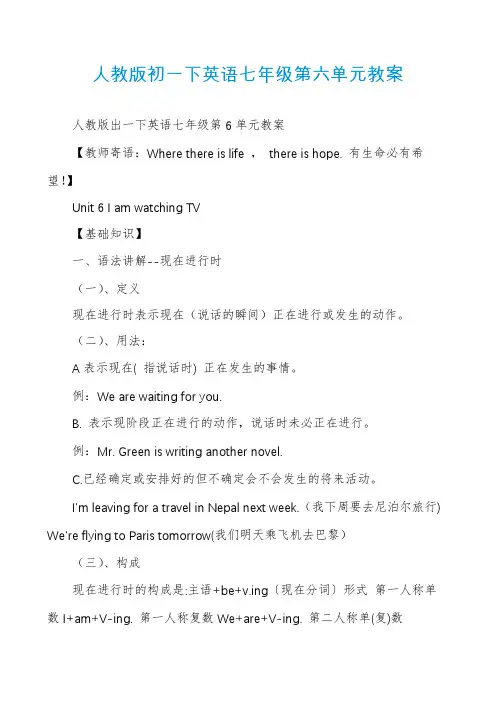
人教版初一下英语七年级第六单元教案人教版出一下英语七年级第6单元教案【教师寄语:Where there is life ,there is hope. 有生命必有希望!】Unit 6 I am watching TV【基础知识】一、语法讲解--现在进行时(一)、定义现在进行时表示现在(说话的瞬间)正在进行或发生的动作。
(二)、用法:A表示现在( 指说话时) 正在发生的事情。
例:We are waiting for you.B. 表示现阶段正在进行的动作,说话时未必正在进行。
例:Mr. Green is writing another novel.C.已经确定或安排好的但不确定会不会发生的将来活动。
I'm leaving for a travel in Nepal next week.(我下周要去尼泊尔旅行) We're flying to Paris tomorrow(我们明天乘飞机去巴黎)(三)、构成现在进行时的构成是:主语+be+v.ing〔现在分词〕形式第一人称单数I+am+V-ing. 第一人称复数We+are+V-ing. 第二人称单(复)数You+are+V-ing. 第三人称单数He(She,It)+is+V-ing. 第三人称复数They+are+V-ing.(四)、句型变化(1)肯定式:be+v-ing She is singing in the next room. (2)否定式:be+not+v-ing The students aren’t cleaning the room. (3)一般问句:be动词提前。
肯定答语Yes,主语+be; 否定答语No,主语+be not。
Are you playing the computer game? Yes, I am. No, I am not. (4)特殊问句:对谓语动词进行提问的:What+be +主语+doing+其他?What is the old man doing under the tree? 对其他成份进行提问的,疑问词+一般疑问句?人教版出一下英语七年级第6单元教案Where is the boy swimming? Who is she waiting for?【及时训练】1、按要求改写句子The boy is playing basketball.否定句:____________________________ 一般疑问句:_________________________肯定回答:__________________________否定回答:__________________________ 对“The boy”提问:__________________________2、把对话补充完整。
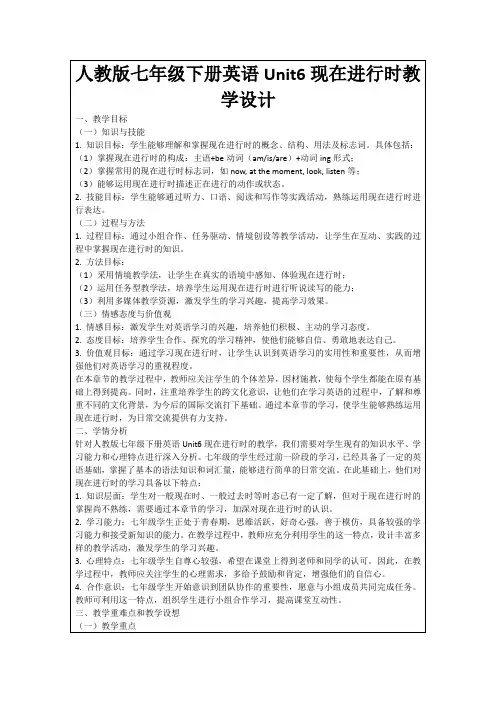
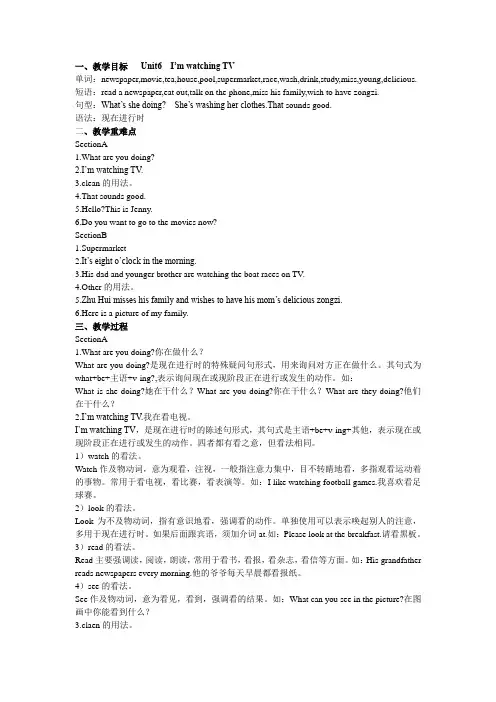
一、教学目标Unit6 I’m watching TV单词:newspaper,movie,tea,house,pool,supermarket,race,wash,drink,study,miss,young,delicious. 短语:read a newspaper,eat out,talk on the phone,miss his family,wish to have zongzi.句型:What’s she doing?---She’s washing her clothes.That sounds good.语法:现在进行时二、教学重难点SectionA1.What are you doing?2.I’m watching TV.3.clean的用法。
4.That sounds good.5.Hello?This is Jenny.6.Do you want to go to the movies now?SectionB1.Supermarket2.It’s eight o’clock in the morning.3.His dad and younger brother are watching the boat races on TV.4.Other的用法。
5.Zhu Hui misses his family and wishes to have his mom’s delicious zongzi.6.Here is a picture of my family.三、教学过程SectionA1.What are you doing?你在做什么?What are you doing?是现在进行时的特殊疑问句形式,用来询问对方正在做什么。
其句式为what+be+主语+v-ing?,表示询问现在或现阶段正在进行或发生的动作。
如:What is she doing?她在干什么?What are you doing?你在干什么?What are they doing?他们在干什么?2.I’m watching TV.我在看电视。
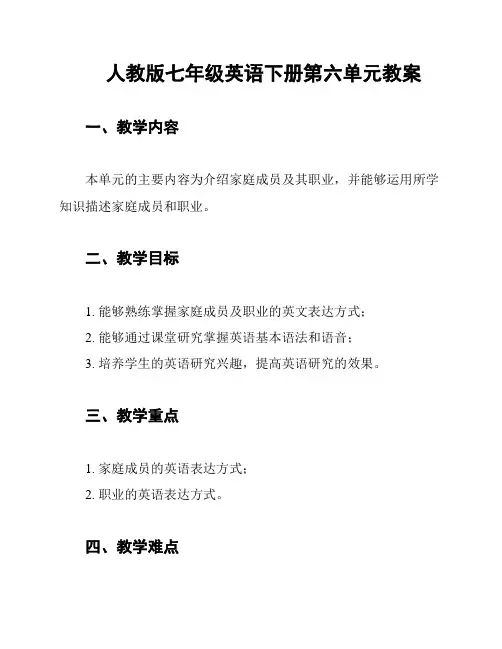
人教版七年级英语下册第六单元教案一、教学内容本单元的主要内容为介绍家庭成员及其职业,并能够运用所学知识描述家庭成员和职业。
二、教学目标1. 能够熟练掌握家庭成员及职业的英文表达方式;2. 能够通过课堂研究掌握英语基本语法和语音;3. 培养学生的英语研究兴趣,提高英语研究的效果。
三、教学重点1. 家庭成员的英语表达方式;2. 职业的英语表达方式。
四、教学难点1. 熟练掌握家庭成员及职业的英文表达方式;2. 正确使用英语基本语法和语音。
五、教学准备1. 教师应提前准备好相关的教学课件和教材;2. 确认教学设备的正常工作。
六、教学过程设计七、板书设计1. 本节课内容:家庭成员&职业;2. 家庭成员表达:father, mother, sister, brother, grandfather, grandmother;3. 职业表达:doctor, teacher, student, police officer, postman, artist;4. 语音表达:单词发音、语调;5. 语法:be动词和助动词的使用。
八、作业布置1. 背诵本课程所学单词;2. 总结be动词和助动词的用法。
九、教学反思本节课的教学目标得到了很好的完成,学生学习欲望强烈、表现活跃,课堂氛围良好。
其中,小组讨论、学生扮演角色等互动方式,很好地激发了学生的学习热情,也帮助到了学生发挥个人特长。
但有些学生课前准备不够充分,导致课堂效果有些不够理想。
在后续的教学过程中,我将更加注重学生课前准备的重要性。
同时在交流中,更加清晰明确地表达英语语法规则,使学生能够更好地理解和应用。
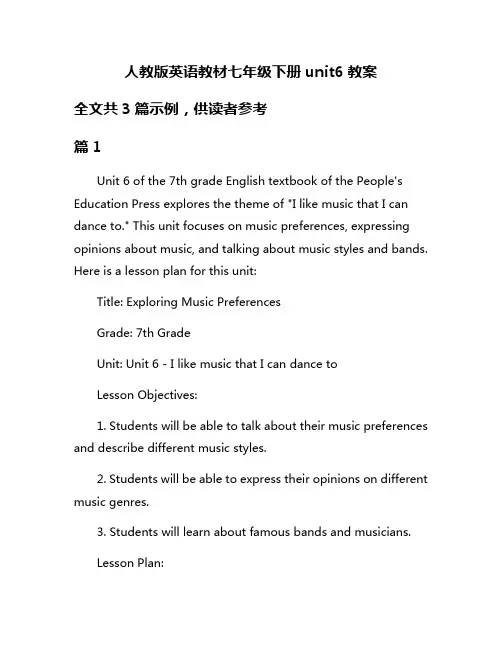
人教版英语教材七年级下册unit6教案全文共3篇示例,供读者参考篇1Unit 6 of the 7th grade English textbook of the People's Education Press explores the theme of "I like music that I can dance to." This unit focuses on music preferences, expressing opinions about music, and talking about music styles and bands. Here is a lesson plan for this unit:Title: Exploring Music PreferencesGrade: 7th GradeUnit: Unit 6 - I like music that I can dance toLesson Objectives:1. Students will be able to talk about their music preferences and describe different music styles.2. Students will be able to express their opinions on different music genres.3. Students will learn about famous bands and musicians.Lesson Plan:Warm-up (10 minutes)- Play a popular song and have students listen to it.- Ask students to describe how the song makes them feel and why they like or dislike it.Vocabulary Introduction (15 minutes)- Introduce key vocabulary related to music genres such as pop, rock, hip hop, jazz, and classical.- Have students repeat the words after you and practice pronunciation.Listening Activity (20 minutes)- Play audio clips of different music genres and ask students to identify the genre.- Discuss why they think the music belongs to a specific genre and what characteristics define that genre.Reading Comprehension (20 minutes)- Read a short passage about a famous band or musician.- Have students answer questions about the reading to test their comprehension skills.Speaking Activity (20 minutes)- Divide the class into groups and assign each group a different music genre.- Ask students to discuss why they like or dislike that genre and present their opinions to the class.Writing Activity (20 minutes)- Have students write a paragraph describing their favorite music genre and why they like it.- Encourage them to use adjectives and adverbs to express their opinions more vividly.Wrap-up (10 minutes)- Review the key points of the lesson and ask students to share one thing they learned about music preferences today.- Play a final song for the class to enjoy and ask students to reflect on how it fits into the different music genres discussed.Homework:- Ask students to research a famous band or musician in a music genre they are interested in and write a short biography about them.This lesson plan aims to engage students in exploring their music preferences and discussing different music styles in a fun and interactive way. By the end of the lesson, students should have a better understanding of music genres, be able to express their opinions about music, and have learned about famous bands and musicians.篇2Unit 6: How long have you been collecting dolls?Period: 1 课题:Knowing about different hobbiesTeaching goals:1. 通过展示和谈论不同的爱好,学生们能够增强对话题“爱好”以及相关单词的了解。
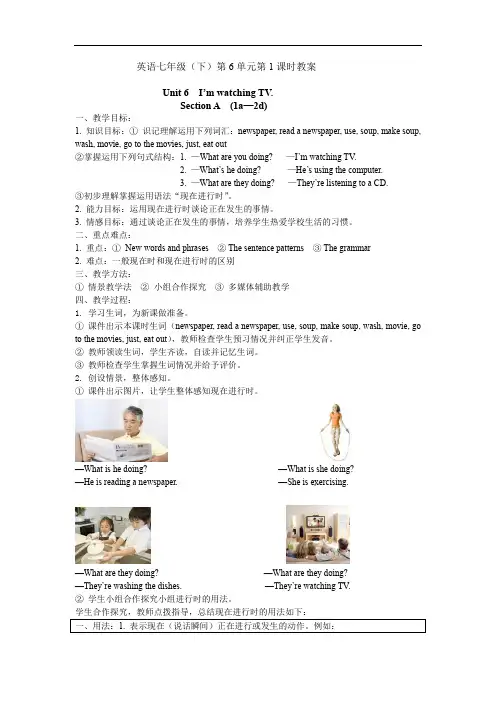
英语七年级(下)第6单元第1课时教案Unit 6 I’m watching TV.Section A (1a—2d)一、教学目标:1. 知识目标:①识记理解运用下列词汇:newspaper, read a newspaper, use, soup, make soup, wash, movie, go to the movies, just, eat out②掌握运用下列句式结构:1. —What are you doing? —I’m watching TV.2. —What’s he doing? —He’s using the computer.3. —What are they doing? —They’re listening to a CD.③初步理解掌握运用语法“现在进行时”。
2. 能力目标:运用现在进行时谈论正在发生的事情。
3. 情感目标:通过谈论正在发生的事情,培养学生热爱学校生活的习惯。
二、重点难点:1. 重点:①New words and phrases ② The sentence patterns ③ The grammar2. 难点:一般现在时和现在进行时的区别三、教学方法:①情景教学法②小组合作探究③多媒体辅助教学四、教学过程:1. 学习生词,为新课做准备。
①课件出示本课时生词(newspaper, read a newspaper, use, soup, make soup, wash, movie, go to the movies, just, eat out),教师检查学生预习情况并纠正学生发音。
②教师领读生词,学生齐读,自读并记忆生词。
③教师检查学生掌握生词情况并给予评价。
2. 创设情景,整体感知。
①课件出示图片,让学生整体感知现在进行时。
—What is he doing? —What is she doing?—He is reading a newspaper. —She is exercising.—What are they doing? —What are they doing?—They’re washing the dishes. —They’re watching TV.②学生小组合作探究小组进行时的用法。
Go for it七年级下册Unit 6 I’m watching TV. Reading阅读课教学设计授课年级:湛江一中培才学校初一级时间:2017年3月25日授课教师:黄敏清一、整体设计理念、思路(一)备课思维过程本课的设计思路基于过程教学理论,分为“话题引入——读前准备——阅读理解——生成产出”四个教学步骤。
通过教师环环相扣的教学设计,引导学生开展更深层的阅读和进行知识的迁移与运用,培养学生学习、思考、合作、赏析和表达的能力,体现核心素养背景下阅读教学的原则、目标和路径,使学生在发展语言能力的同时在学习能力、思维品质和文化品格方面得到一定的提升。
(二)教学优化设计1. 本课使用了新颖的教学手段,采用人机交互对话的方式引出本节阅读课的悬念,从而布置教学任务、进行情感教育等。
体现提出问题,引导学生解决问题的教学思路,从而有效激发学生的学习兴趣,使教学过程环环相扣,也体现了教学过程的生活化、情景化。
2. 本课运用简单且易于激发学生兴趣的自制视频作为阅读任务前的导入,简单明了,直奔主题。
3. 针对七年级阅读材料较为简单这一情况,引导学生在巩固本单元目标语言的基础上产出新的语言,并将本环节培养的能力迁移到读后的运用过程中。
4. 阅读后的小组汇报活动,着重培养合作探究的学习策略。
同时,在学生进行话题汇报的准备过程中,对中华传统节日文化进行了评价和赏析,全组同学在展示的过程中也锻炼了自身的语言表达能力,增强自信心。
二、教学内容分析本次授课内容选自人教版Go for it英语七年级下册Unit 6I’m wa tching TV.,课型为阅读课。
本节课不仅帮助学生在阅读文本的过程中学习语言知识,还学会运用阅读策略去解读文本,并着重培养学生对所学知识进行迁移和综合运用的能力,体现在指导学生完成主题为“谈论你最喜欢的节日及其活动”的任务过程中,通过引导学生进行合作交流、分析比较、大胆展示,最后进行传承节日文化的情感教育与升华,使学生增强爱国主义情怀与传承中华文化的信念。
七年级下册第6单元《I’m watching TV》Section B 2a-2c教案一、教学目标(一)知识与能力:1.Key vocabulary: realize, by the side of, make one’s way, point out sth.2.Target language: Kate saw a dog by the side of the road.When the school basketball competition started, Kate was still making her way to school.3. Be able to talk about past events and tell stories using the target language.4. Train students’ listening and speaking skills.(二)过程与方法:1.我通过给出8个词组作为挑战1,让学生浏览文章,达到预习检测的目的。
同时拓展“East or west, home is the best”,j激发同学们热爱家乡的情怀。
2.给出挑战2的任务——3道问答题,让学生快速阅读,达到整体认知的目的。
3.挑战3通过略读的方式,再读课文。
先自主学习再合作交流,进行连线。
进一步熟悉文章。
4.挑战4再让学生阅读,把握文章的细节,然后进行判断正误。
5.挑战5通过完成表格,让学生以小组合作的方式,再次感受现在进行时,达到深层理解文章的目的。
6.挑战6通过改编文章的对话使学生达到身临其境的目的。
7.挑战7写作则是一个精炼提升的环节。
让学生把所学知识能正确运用到写作当中。
(三)情感态度与价值观:Encourage students to write and speak by using the present progressive.二、教学重难点(一)教学重点:教学重点:1. 理解2b中的短语及文章的意思。
七年级下册Unit6《I’mwatchingTV》教学设计七年级下册 Unit 6 《I’m watching TV》教学设计作为一名为他人授业解惑的教育工作者,编写教学设计是必不可少的,教学设计是连接基础理论与实践的桥梁,对于教学理论与实践的紧密结合具有沟通作用。
教学设计应该怎么写才好呢?以下是店铺整理的七年级下册 Unit 6 《I’m watching TV》教学设计,希望对大家有所帮助。
一、设计理念1、以学生为主体,教师为主导新课程理念下的创新教学不仅仅是过去的“填鸭式”的教学,而是以学生发展为中心的师生共同参与的教学活动。
现在的英语课堂应是师生互动、心灵对话的舞台,而不是优秀教师展示授课技巧的表演场所。
课堂是学堂而不是讲堂,学生是教学中的主体,一个优秀的教师在课堂上只讲十几分钟,要把大量的时间换给学生,让他们交流、探究、质疑和消化,课堂是点燃学生智慧的火种,让学生走出教室的时候仍面对问号,怀抱好奇。
总之,焕发出生命活力的课堂才是理想的课堂,这样的课堂才是新课改所追求的课堂。
2、理论联系实际,培养学生的创新能力教育改革的一项重大任务就是要全面推进素质教育,培养学生的创新意识。
创新是一个民族的灵魂,是国家兴旺发达的动力。
教育并不是通常灌输,而是不断发现、发掘和强化学生的创造潜力,启迪学生的创造性思维,培养学生的创造精神,造就大批创新人才。
3、以学生终身发展为本教师在整个教学过程中要注意培养学生的自学能力,授之以“鱼”而不如授之以“渔”,使学生学会独立思考、会探究、会发现、会解决问题的能力,教师一定要为学生终身学习,提高综合素质奠定坚实的基础。
4、合理利用教材,做教材的主人教材在整个课程体系中具有重要的地位,但它并不是学生学习的唯一渠道。
教师应创造性地使用教材,积极开发和合理利用课程资源,教师一定利用好教材,是“用教材”而不是“教教材”。
现在的英语教材具有很大的开放性、灵活性和选择性,教师一定要因材施教,联系自己学生的实际情况,根据需求对教材内容作适当的补充和取舍,一定要重组教材,使教材内容更加符合学生需要,更贴近学生的实际生活,教师要做教材的主人而不是做教材的奴隶。
UNIT 6 I’m watching TV.Section A 第1课时(1a-1c)自主学习方案1.自学生词,并记住拼读及拼写。
2.预习课本找出重点短语及句子。
(见学案自学导练内容)3.读记后完成自学导练内容。
课堂导学方案Step1 情景导入让几个学生做几个动作或用多媒体展示一些动作。
T:What's he doing? He's writing. What's she doing? She is reading a book.(Then show some pictures that some people are doing something. The teacher asks and the students answer )T: What's he doing?Sl: He's singing.T: What's he doing?S2: He's watching TV…环节说明:通过提问引出本节课的知识目标,在师生问答中自然而然导入新课。
Step 2完成教材1a-1c的任务1.先观察la中的图片,尽可能多地说出他们的活动。
(2分钟)2.将所给的短语和图片中的活动相匹配,并朗读图片中的对话,练习此对话。
(2分钟)3.认真听录音,将Jenny,John以及Dave和Mary正在进行的活动找出来,完成1b听力内容。
(3分钟)4.再听一遍录音,学生跟读,模仿语音语调。
(2分钟)5.让学生两人一组就la图片中的人物活动仿照 lc进行对话练习,邀请几组学生表演对话。
(5分钟)6.小结训练。
(2分钟)Look ! They D music.A. listenB. is listenC. is listening toD. are listening to环节说明:听说结合,第一时间向学生传达语言目标,通过结对对话练习和小结训练,语言目标得以强化。